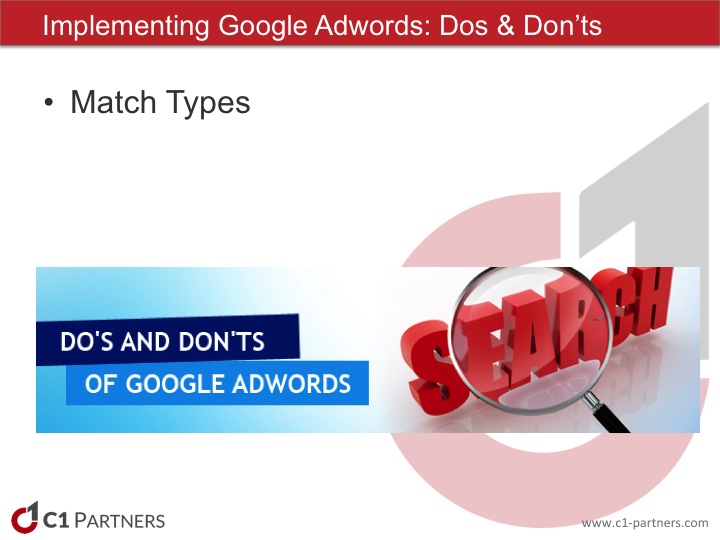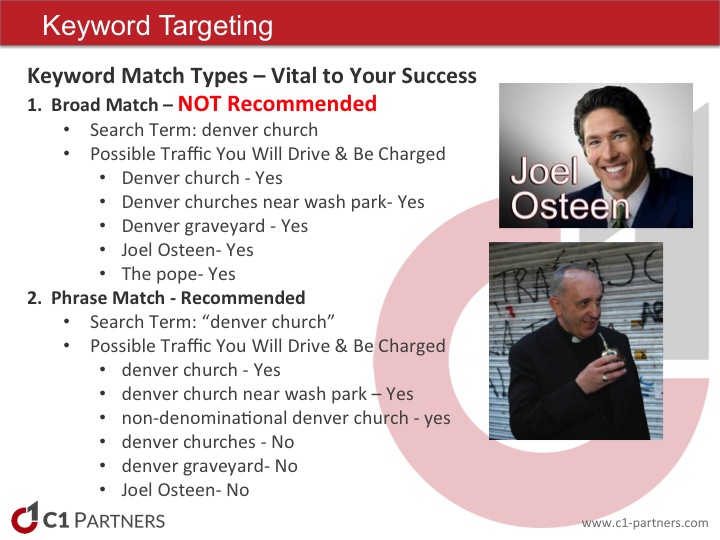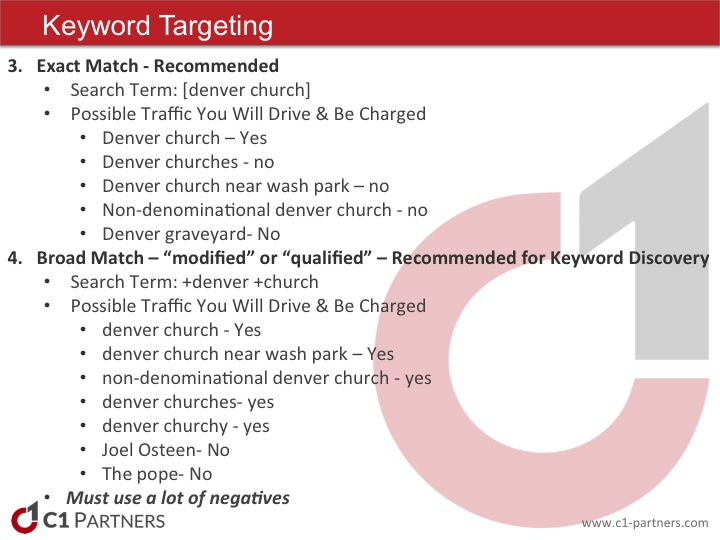Paid Search vs. Paid Social vs. Programmatic: What’s the Difference?
Read Storyby RefractROI
Keyword match types are vital to your success.
This is part 6 of a presentation transcript given to Snowsports Industry Association – the entire video can be found here: How to use Google Adwords
Match types are really, really important, and we’re going to describe what this means here in a second. I want to show you this. This is a good real live example in Google Adwords. The default is set in Google Adwords to be very, very general and broad and drive very general and broad traffic to your website.
You have to know what things to go in there and change in order to tighten things up and make sure you’re targeting the right geography, the right search terms and even using negative terms to avoid wasting money.
Here’s an example: When I set up keywords, and I say, “Hey. You know what? I do not want to include plurals, misspellings and other close variants, because guess what Google, I’m targeting a very specific search term or search phrase.” The default is that it will include plurals, misspellings and other close variants. Notice when I click on ‘Do not include close variants’, which is to me one of the best things you can do besides avoiding broad match terms to keep erroneous traffic away from your site, Google tries to talk you out of it. “Your ads may not receive as many impressions or clicks if you do not include close variants.”

Guess who gets paid every time someone clicks on the ad? Do you get paid every time someone clicks on an ad in Google? No. Google gets paid. Google has a bit of a subjective opinion on what type of traffic you should get to your site. The subjectivity isn’t necessarily geared towards your paradigm what’s important to you and your business. It’s important to know how to change these defaults so that you can makes certain that the money you spend drives money back into your pocket rather than only in Google’s pocket.
Broad match is not recommended. What broad match means is, let’s say I have a search term in our campaign ‘denver church’ which I do. We do the SEO and pay per click for my church here in Denver and they rank number one for Denver churches, so that’s a good thing. We also do their paid search because it’s great to have that much exposure on the first page.
If we were to put in the word ‘Denver church’ as one of the keywords that we selected, and we left it broad match, then Google could bring back all different kinds of traffic When someone types in ‘Denver church’, capital D, lower case C, it doesn’t matter, the ad will come back, that’s great. When someone types in ‘Denver churches near wash park’ which is a park just on the south side of Denver, it would also come back. That might be okay. Denver graveyard. Now, may be kind of related. There are often graveyards next to churches, but I don’t see the relation. If you left broad match on, when someone typed in ‘Denver church’, you’re likely going to get traffic from the search ‘Denver graveyard’. We saw this at our church, so …
You may or may not know who Joel Osteen is. He’s a famous pastor out of Houston. You may or may not like him. I don’t really want to give an opinion here, but we found when we targeted Denver church on broad match, this was a few years ago, a ton of traffic came to the website via term ‘Joel Osteen’. Now, I realize he’s a pastor of a church, but he’s not in Denver and neither one of these words are search term. When you do broad match, you just never know. It might even come up when someone types in the ‘Pope’ which is somewhat related, but do we really want to pay for traffic to our church website base in Denver for searches like Denver graveyard, Joel Osteen and the pope? The answer is no. We do not.
When you do phrase match-which is putting quotations around keywords, this is the possible traffic. You’ll be charged for it. ‘Denver church’, that’s great. ‘Denver church near wash park’, that can be good for this church. By the way, if they don’t like … If they aren’t near wash park, then they might want to add that as a negative search term which you can within your campaign. ‘Non-denominational Denver church.’ If you’re a non-denominational Denver church, this is a good result. ‘Denver churches’ plural, would not be brought back here, although, if I called Google that they’d tell me, “It might be”, because even they’re phrase matched, they don’t always follow their own rules is my point. Ideally, this should not come back on this, but you just never know. That’s why you got to watch these things tightly. Denver graveyard had better not come back when someone types in ‘Denver church’ and I’m using phrase match. Phrase match means that these two terms need to be in order and part of the overall search. Then, there is Joel Osteen, and he would not come back, the pope would not come back, we’d only get pretty much what we want which is Denver church, Denver church near wash park and non-denominational Denver church. Exact match. By the way, I do recommend phrase match and I do recommend exact match.

Exact match means that, “Hey. If someone types in ‘Denver church’ and someone clicks on my ad, I’ll get charged.” Not for Denver churches, not for Denver church near wash park, not for non-denominational Denver church, not for Denver graveyard.
The challenge with phrase match and exact match especially exact match is they can limit our opportunity to discover new ways in which people search. One thing that we use is a thing called ‘Broad match’ with qualified or modified. I’ve heard it called both things, but all this means is you put a plus in front of the Denver, and you put a plus in front of the church. If you do that, this is the possible traffic you will drive in for which you may be charged. If someone types in ‘Denver church’, you will have to pay for that.
If someone types in … and of course, they click on your ad. If someone types in ‘Denver church near wash park’, you would also pay for that traffic. If someone types in ‘Non-denominational Denver church’, yes. Denver church is also yes. Even though this isn’t a plural, it opens up a little bit and it’s something between broad and phrase and exact. Denver church E for example, you might get that traffic to your site, but you won’t get Joel Osteen, and you won’t get the pope. The other thing you’ll get is you’ll find out if people type in terms like … The one thing that we discovered was ‘South Denver church’.
Now, we know people search for the term ‘South Denver’, we can add that as a keyword. There may be other terms that you discover, people like gay-friendly church. You have to decide, “Are you a gay-friendly Denver church or not?”, and then choose whether or not to add that as a negative. You discover how people search by using broad modified or broad qualified. As long as you do it carefully, use a lot of negatives and watch it frequently for keyword discovery – which can also help drive your SEO behaviors.

Hey there, anything we can assist with?